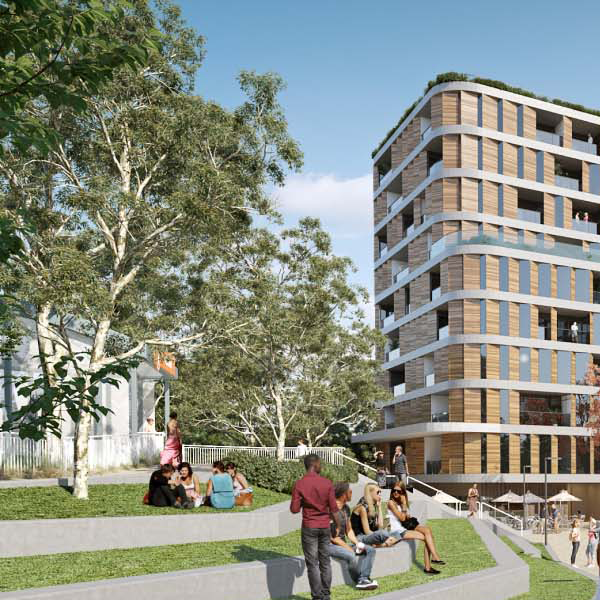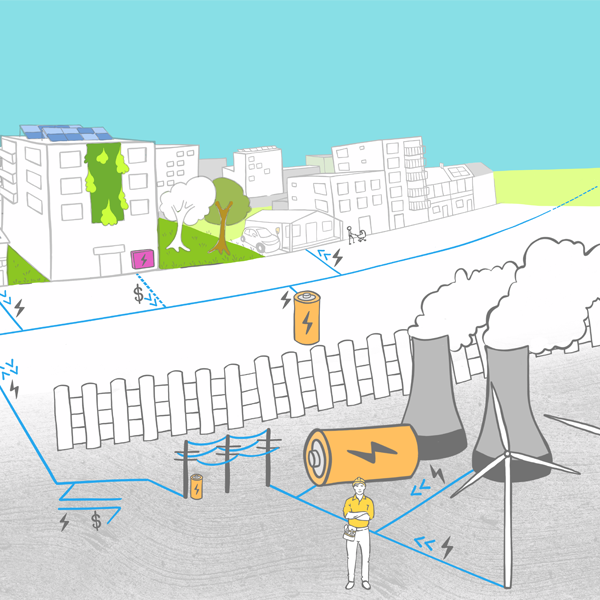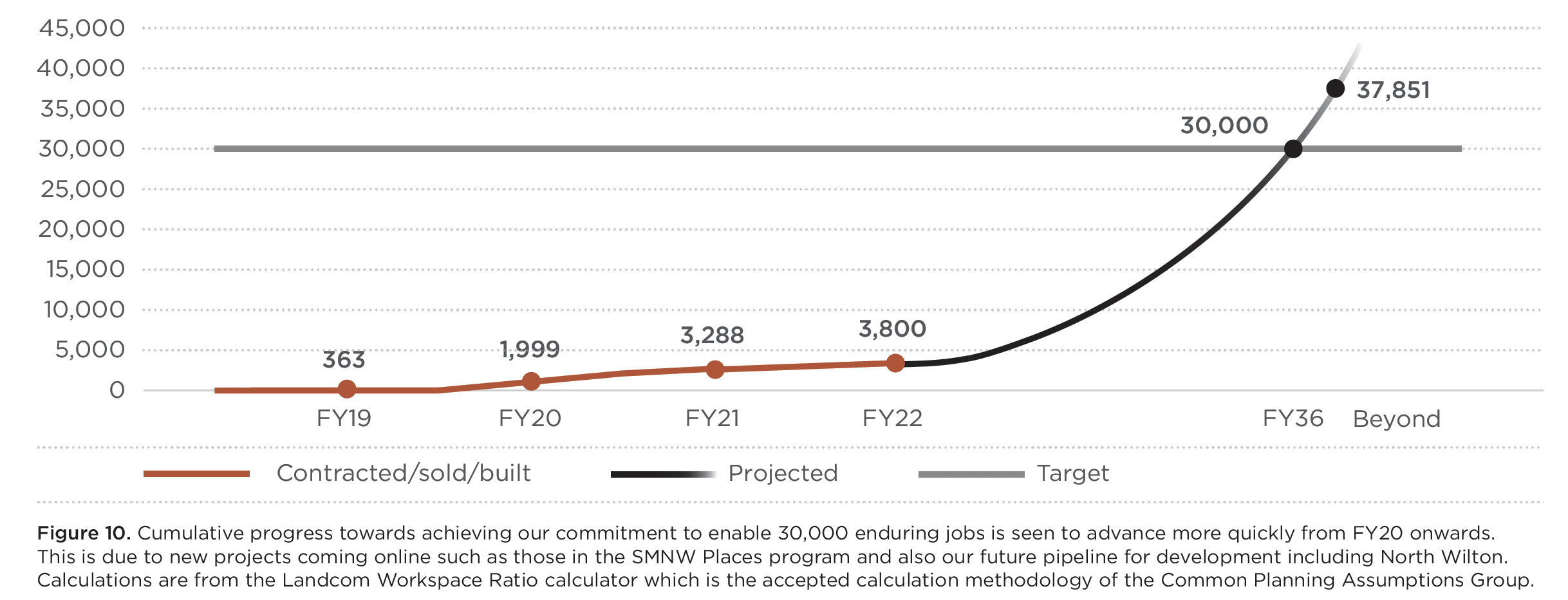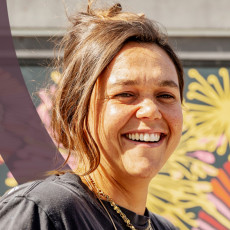Leadership Goal
Objective
Drive the delivery of productive places, and enable jobs for the future.
Target
To contribute to a global innovation economy by enabling 30,000 enduring jobs for the future by 2036.
Relevant Sustainable Development Goals
5 Year Results

Enabled the creation
3,800
of enduring jobs

Engaged over
25,800students across our Skills Exchange, research and excursion programs

Invested over
$2.8 millionin cash and in-kind contributions to research and development
Overview
Landcom’s Productive Places pillar is focused on a leadership goal to ‘contribute to the global innovation economy by enabling over 30,000 new jobs by 2036’. This is our economic pillar committed to delivering places that will be productive and engaging for those that live there.
This leadership goal was developed to reflect Landcom’s commitment to economic development, strengthening technology infrastructure and advancing equitable opportunities for skills development and education.
Landcom addresses the enablement of jobs and innovation through the following focus areas:
- Training & Employment
- Innovation
Each of these focus areas includes a suite of targets to measure our success.






New Approach to Research
Landcom’s new approach to research is purposefully designed to deliver on our Strategic Directions for housing, partnerships and affordability. The new approach prioritises outcomes-based research investments that help address gaps in how industry, academics and government are responding to key challenges in delivering affordable and sustainable housing.
Read more
Creating A Spark
Recognising the need to support actions outside our direct sphere of control, Landcom is actively working with partners in government and industry to explore opportunities to decarbonise the built environment in NSW beyond the boundaries of our projects.
Read more
Air Quality Journey
Air quality has been a priority for Landcom since the inception of our Sustainable Places Strategy.
Read more
Management Approach
Our leadership goal to enable 30,000 jobs across our communities by 2036 is in direct response to the broader NSW government objectives. By 2036, the Greater Cities Commission forecasts the Sydney region alone will need 817,000 new jobs. As part of Landcom’s mandate we support these targets by developing great places and mixed-use communities where people can work, live and play.
In FY18 our Economic Development Working Group32 released an approach for overcoming the challenge of consistently and effectively calculating our efforts to enable enduring local jobs. We use proxy employment ratios, developed through detailed research and benchmarking, attributed to various land uses based on m2 gross floor area. Examples of land uses included are commercial, retail, industrial, community, cultural, tourism, health services, education, storage, hotel, serviced apartment, student housing and residential. As jobs creation is a long term goal for Landcom, we report our performance based on the FY actuals, and forecast jobs created for the life of a project. This gives us a clear indication of whether we are on track to meet our 2036 target.
In FY19 Landcom’s methodology was also adopted across the NSW Government’s Common Planning Assumptions Group (CPAG), influencing a consistent government wide approach.
We also contribute to advancing education and skills development across our communities. We work with industry and registered training organisations to develop programs that address specific skills requirements of locals and provide training opportunities and employment pathways for those experiencing low or long-term unemployment. We also collaborate with schools and other educational institutions to deliver learning and youth engagement programs that are aligned with the NSW primary and secondary curriculum topics.
For Landcom’s FY21 performance for enabling jobs and providing local Training & Employment outcomes see Training & Employment Performance Results below.
_________________________
32 Participants include NSW Government Architect, Greater Sydney Commission
Landcom has a long history of leading research and innovation that advances the property and development industry and future-proofs our communities. Landcom also engages with industry and local government including a recent partnership with Campbelltown City Council and Sourced Energy to investigate how councils, developers and energy providers can work together to deliver energy sharing schemes in NSW communities and improve the communities’ energy resilience (see Case Study: Creating A Spark).
Landcom addresses emerging technologies in our Innovation focus area. Currently we are seeking to roll out smart technology to our new communities in the form of electric vehicle (EV) rapid charge stations, weather sensors and we continue to provide free Wi-Fi in public places. We see these initiatives as future-proofing communities, improving their resilience, reducing inequalities in access to information and ensuring early adoption of future transport technologies.
Ultimately, the provision of EV chargers throughout Landcom communities improves resilience, reduces greenhouse gas emissions, and reduces transport related cost of living expenses for residents. These targets also contribute to Landcom’s low-carbon transport approach, including accessibility to public transport, walkable and cycling-friendly neighbourhoods (see Health, Equity & Inclusion,Community Connection & Safety).
Landcom has recently adopted a new approach to research that builds on the learnings from our previous Landcom University Roundtable (see Case Study: New Approach to Research). The Roundtable ran from 2016 to 2022 as part of the former UrbanGrowth NSW approach to research. During that time Landcom and Roundtable participants worked on over 15 different research projects in support of identifying innovative solutions that will improve housing affordability and make our communities happier, healthier and more livable.
Landcom’s new approach to research is purposefully designed to continue to deliver on our Strategic Directions for:
- Housing – increasing the affordability, supply and diversity of housing
- Partnerships – partnering with others to unlock development opportunities and improve delivery
- Affordability – demonstrating excellence in sustainable development and planning practices.
Our Sustainable Places Strategy identifies a number of initiatives as future opportunities to enhance our Productive Places commitments. These include:
- executing the objectives of our Reflect Reconciliation Action Plan
- continuing to engage with industry on smart cities and innovation.
Landcom continues to be an ongoing member of both the Department of Planning and Environment’s Circular Economy and Net Zero Working Groups as well as becoming a participant in the Office of Energy and Climate Change’s Sustainability and Resilience Interagency Working Group and focuses on innovation via our research, strategic milestones and Green Star certifications.
Performance Results
See below our performance results for each of the reporting areas within our Productive Places Pillar.
Training & Employment
Targets
Performance
To contribute to a global innovation economy by enabling 30,000 enduring jobs for the future by 2036
Performance
FY21
Performance
(Over 30,000 projected by 2036)
FY22
Performance
(Over 30,000 projected by 2036)
5 Year
Performance
Targets
Projects to engage and foster education, learning or employment outcomes via actives or initiatives, based on identified needs of the local and regional community
Performance
FY21
Performance
FY22
Performance
5 Year
Performance
Performance Overviews
Landcom is on track to meet our commitment to enable 30,000 enduring jobs by 2036. FY22 in scope projects include SMNW Places program, Macarthur Gardens North and Fennell Bay as well as our North Wilton project, which was announced in FY21 and is forecast to make a substantial contribution to Landcom meeting this goal.
These forecasts will continue to be subject to change as future projects remain in the planning phase and we respond to market demand.

In total, Landcom staff engaged over 7,300 primary, secondary and tertiary students throughout the reporting period, as part of our contributions to university programs, school programs, events and engagements.
The Collaborative Urban Teaching Platform (CUTP) is a multi-university, cross-disciplinary urban teaching partnership developed by Landcom and several NSW-based universities. It aims to foster engagement between research institutions, government, and students.
During the university Spring semester of 2021, we engaged with 116 undergraduate students from the University of Technology and University of Sydney on our Macarthur Gardens North project. Students looked at the site from an urban design perspective, investigating urban solutions to challenges such as the COVID-19 pandemic and urban heat. The CUTP also reached 165 students during the university Autumn semester of 2022 from the University of Sydney’s School of Architecture, Design and Planning, with students using our Macarthur Gardens North project as a case study.
In May 2022, Landcom launched our first workshop with Red Room Poetry supporting their ‘Poem Forest’ program. The program is a collaboration between Red Room Poetry and the Australian Botanical Gardens, supported by Landcom, and engaged 15 school students who were encouraged to listen to poetry in language and sing to Country while writing their own poems. Students were accompanied by First Nations Elders and poets in the Australian Botanical Gardens in Mount Annan. For more information, (See Case Study: Red Room Poetry).
In FY22 Landcom staff also contributed to a University of NSW built environment course on planning with Indigenous Peoples. Staff aimed to demonstrate practical learnings from our experience working closely with Local Aboriginal Land Councils when planning Landcom’s communities.
In FY22 Landcom continued our partnership with National Theatre for Children, which ran a number of educational workshops focused on building mental resilience to schools across Greater Sydney. The ‘Mind Masters’ workshops were delivered in 13 primary and 11 secondary schools, using live and pre-recorded theatre, performance and student engagement to promote concepts and practices to enable good mental health.
The longitudinal program was planned to be focused in schools within our communities as live performances, however the impact of COVID created an opportunity for the program to be designed as a digital live stream offering, which expanded the reach and number of students engaged. Designed with a clinical psychologist it also complements the NSW curriculum. This year it built on sessions delivered in FY21, so that students were exposed to multiple teaching points over time such as mindfulness, stress, resilience, and the link between mental and physical health.
The FY22 program reached a total of 7,004 students and the impact measured by pre and post testing revealed positive outcomes for most schools across several key areas such as stress, resilience, physical health, mindfulness, and overall impact. Further positive impacts are expected to be achieved as this program continues to be rolled out in FY23.
Innovation
Targets
Performance
Measure and report annual investment in research and development
Performance
FY21
Performance
FY22
Performance
5 Year
Performance
Targets
All project teams engaged in Landcom’s Roundtable ‘Communities of Practice’ program
Performance
FY21
Performance
FY22
Performance
Targets
Greenfield/Regional: all new communities provide electric vehicle chargers to service a minimum 10% total dwellings (as either publicly accessible or private use)
Urban Renewal/High Density: provide a minimum 10% parking yield, per parking lot, as EV Charge Station ‘turn-key’ ready at development completion
Performance
FY21
Performance
FY22
Performance
5 Year
Performance
Targets
Key open spaces to provide free Wi-Fi access
Performance
FY21
Performance
FY22
Performance
5 Year
Performance
_________________________
33 Due to the challenge of finding mutually-agreed, not agreeable research and the closure of the Roundtable, no project teams engaged in the Communities of Practice in FY22.
34 Averages are based on the years when there were projects in scope.
Performance Overviews
In FY22 we funded a range of research projects through our new approach to research, including our Smart Energy Precincts paid pitch process, ‘Creating A Spark’ collaborative research with Campbelltown City Council and work towards our carbon neutral and water positive leadership goal.
In FY22 we also worked to complete our air quality framework and guidelines and pilot the outcomes with some of our communities (see Case Study: Air Quality Journey). We intend to publish this framework and guidelines in FY23.
In FY22 Landcom had three projects in scope for our targets related to the provision of electric vehicle (EV) rapid charge stations or shared charging points. This target applies to new Landcom communities and includes the SMNW Places precincts Tallawong South, Showground and Epping which were sold to the private sector with either conditions of sale or legislative requirements to deliver against these targets. Our Macarthur Gardens North, Edmondson Park, SMNW Places Precincts of Kellyville, Bella Vista, and Norwest and Schofields projects will be included in this target when the superlots and builder lots are put to market. New projects including Queenscliff, Austral and North Wilton will include this target as part of design for each project, but as they are still under assessment, they are not within scope for this year.
In FY21 we sold four of our six fleet vehicles. During FY22, we explored options to replace these fleet vehicles and are expecting to procure two new electric vehicles in FY23.
There were five projects in scope for this target during the reporting period. Macarthur Gardens North, the SMNW Places precincts of Kellyville and Bella Vista as well as North Wilton committed to public Wi-Fi through the Green Star certification process, while Austral committed to delivering this through design delivery. The Schofields, Epping, Norwest and Queenscliff projects fall outside the scope of this target, as they do not have sufficiently large community open spaces to warrant or draw demand for public Wi-Fi.
Our Sustainable Places Strategy
Our Sustainable Places Strategy with four Leadership Goals guides the way we deliver new communities. Our FY22 performance for each part of our strategy is accessible below.



